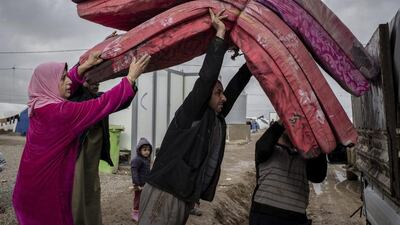BAGHDAD // The defeat of ISIL in Iraq will take another three months, prime minister Haider Al Abadi said on Tuesday, as Iraqi forces struggle to dislodge the extremists from their Mosul stronghold.
The drawn-out battle speaks of the limitations of the government forces, the staunch defence put up by the militants and the high risk involved in taking back a city with some 1 million civilians still living inside it.
“Conditions indicate that Iraq needs three months to eliminate Daesh,” state TV quoted Mr Al Abadi as saying.
After optimistic forecasts of Mosul being back in government hands before the end of the year, almost everyone in Iraq now agrees that early 2017 is a more realistic timeline.
Two months into the campaign, most of the fighting has been concentrated in eastern Mosul, east of the Tigris River, where Iraq’s special forces are battling ISIL fighters street by street. Very little fighting is taking place north, south and south-east of the city, where army troops and the militarised federal police are deployed. The lack of progress there suggests the special forces, by far Iraq’s most battle-hardened outfit, will likely have to take those areas after securing eastern Mosul.
-------------------------------------------
READ MORE: In secret phone calls, Mosul residents tell of being afraid to leave their homes
-------------------------------------------
The battle for the last Iraqi city still in ISIL hands has laid bare the country’s political and sectarian woes. A liberated Mosul will present a host of other problems that the Shiite-led government in Baghdad, armed with considerable political capital gained from defeating ISIL, must address quickly.
Since it began on October 17, the campaign has been accompanied by an outreach programme towards the mostly Sunni residents of Mosul. The propaganda machines of the government and the military have tirelessly emphasised concern for the safety of civilians still living inside Mosul. State television has peppered its coverage of the battle with scenes of compassion shown by troops towards the city’s residents, sharing their rations with them or organising food and water distribution.
In Baghdad, Mr Al Abadi has spoken at length of national reconciliation and how the fight against ISIL has brought the country’s main groups – Shiites, Sunnis and Kurds – together for the first time in years. He highlighted the Sunni militiamen and Kurdish Peshmerga forces fighting alongside government troops in Mosul as an example of this newfound unity.
In a concession to the Sunnis, the government barred the powerful Shiite militias from taking part in the battle for Mosul, fearing their participation could anger Mosul’s mainly Muslim residents and evoke memories of their abuse of Sunni civilians elsewhere in Iraq.
But on the battlefield, the initial successes soon turned into something of a stalemate, with the advance of the special forces towards the Tigris halted for close to two weeks and the army’s 9th Armoured Division in the south still on the edge of the city after an ill-fated foray earlier this month proved costly.
While the special forces are made up of seasoned city fighters, there are not enough of them. The 9th Division, meanwhile, is not equipped to fight on the streets and, like most other army outfits, does not seem to have fully recovered from the meltdown the military and security forces suffered when ISIL blitzed across northern and western Iraq in the summer of 2014.
Iraqi forces have struggled against the defences prepared by ISIL’s fighters, whose resilience appears to strengthen as the battle moves deeper inside the city. The militants have employed a wide range of tactics, including suicide bombings, constant sniping and ambushes. The tactics were to be expected given that the extremists had ample time to prepare – the intention to liberate Mosul was announced by the government in March.
Many believe it is a matter of time before Mosul is fully retaken, but even that poses a new set of challenges for a government long accused of corruption and sectarian policies and with an economy reeling from low oil prices and the costs of war.
The liberation of Mosul would leave the militants with several small outposts in the north and west of Iraq that could be retaken with relative ease, but the group would morph into an urban terror group with sleeper cells and the ability to strike across much of Iraq. It may not again enjoy the sympathy or support of Iraq’s Sunni Arabs as it did two years ago, but that would depend in large part on whether the Baghdad government would take steps to address some of the Sunni grievances, like reining in Shiite radicals, showing goodwill to the Sunnis and adopting even-handed policies toward the once-powerful minority.
It may be a tall order, since the government and its Shiite-dominated military and security forces as well as the state-sanctioned Shiite militias would be filled with the sort of triumphalism after the defeat of ISIL that they would not feel the need to redress injustices inflicted upon the Sunnis.
The signs are not encouraging.
Parliament last month passed legislation that accorded the mostly Shiite militias full legal status, declaring them part of the armed forces, complete with the salary scale and a range of perks. The move was immediately decried by Sunnis and, in response, the government said the legislation was the least it could do to reward the militias for their sacrifices in the fight against ISIL.
foreign.desk@thenational.ae

